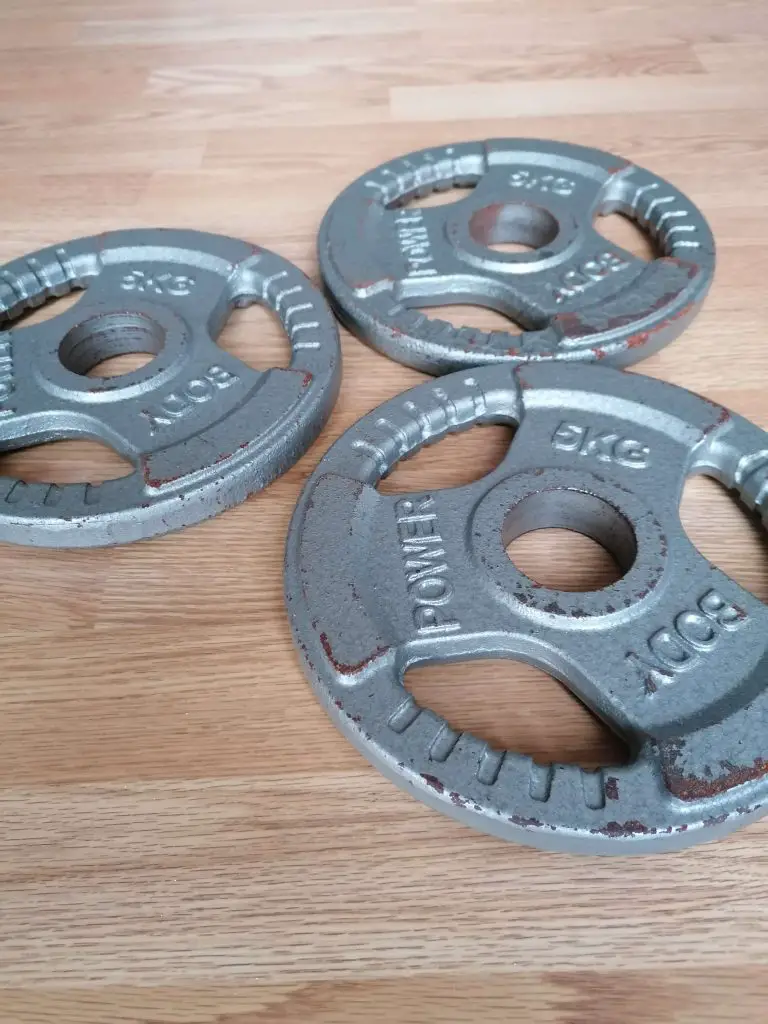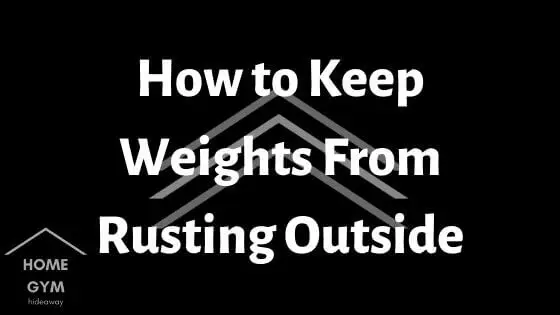Working out at home can either be a luxury or a struggle. Unless you are blessed enough to have a large dedicated space for a home gym or garage gym, you might find the only real way you can workout from home is to keep your weights and gym equipment outside.
This seems like an easy solution and provided you don’t live somewhere that frequently rains (like over here in the UK) or snows, working out in your yard can be a great option. Something you need to keep in mind though is how you can keep your weights in good condition and mainly how to keep weights from rusting outside.
Iron and steel weights will rust at a much faster rate when kept outside as they oxidize with water and air. To keep your weights from rusting outside you should wipe them down after every use, frequently apply a lubricant or rust inhibiting solution, and store them in a cool and dry place when not in use.
While training outside offers certain benefits, you’ll also be faced with a new challenge of maintaining your weights and gym equipment. In this article, I’ll cover whether or not weights will rust when kept outside and what you can do to minimize or prevent this in the first place.
Will Your Weights Rust Outside

The answer here is unfortunately a very simple one – yes, your weights and equipment will rust if left outside.
Cast iron and steel weights are the most susceptible to outside weather conditions and are more likely to rust when kept outside. The only real exception is if you are using vinyl, concrete, or neoprene weights but even then, your bars and other equipment will still be prone to rust when kept outside.
Rusting is the result of oxidization, a natural reaction on metal when exposed to water and air, and no matter how hard you’ve been working out, when it comes to you vs the elements there will only be one winner. Having said that, there are some very simple steps you can take to minimize the effects of rusting on your equipment.
How do You Store Weights Outside
Covers for your weights and gym equipment can be quite costly, but there is a simpler and much cheaper option, which is to cover the weights in a waterproof material.
A sheet of heavy garden tarpaulin will set you back just a few dollars at your local garden center, and when used to cover your weights will provide a completely waterproof barrier to protect your equipment from rusting. Just make sure that you let the weights dry out every now and then if you’re storing them for a longer period of time.
When storing your weights under a cover like this after a workout, just remember to make sure the weights aren’t in direct contact with the ground. It might seem totally harmless but the material can soak up moisture from the ground and rust even under a cover.
Another way to store weights outside is in a dedicated garden box that is airtight and waterproof. If you’re a relatively strong lifter then this can be tedious work taking out numerous weight plates before and after every session so if you can get a garden storage box that is similar to a bicycle storage box, you can fit a weight plate tree inside which makes both storaging and use 100% easier.
The main thing I’d recommend against is just simply leaving your weights outside without protection from the elements. This might seem like a harmless and convenient way to store your weights initially, but it will cause your weights to rust in just a few weeks so storage outside in the open air should be avoided completely if possible.
Storing Weights in a Shed or Garage
The most important thing to remember when it comes to preventing your weights from rusting is that water is the enemy. Much like the food in your kitchen cupboards, your weights will last the longest when stored in a cool dry place.
Sheds and garages, however, are very rarely a dry enough space to store your weights in without having to worry about rust. Unless your garage is completely insulated like the rest of your house, you will still have to make sure to take steps to prevent your weights from rusting.
One key piece of equipment you can use when storing your weights inside is a dehumidifier which will reduce moisture in the room. I’ll cover this in more detail in a separate article but as I mentioned above, a cool dry place is the best area for storing your weights and preventing rust.
How to Keep Weights From Rusting Outside
No matter how hard you try to cover your weights and equipment, if you are storing them outside then the process of oxidization and rusting is always going to be a potential threat.
It only takes a little bit of moisture to cause your weights to start corroding, so the safest bet is to make sure you treat your equipment consistently, and with the correct products. Remember, it doesn’t matter how good the product you’re using is: if you’re not regularly wiping down your weights and bars then they aren’t going to last as long as they could.
Avoid the Elements
The simplest and most obvious way to stop your weights from rusting is to not expose them to the elements that will damage them.
If you have the space to store your weights and equipment inside, maintaining them will require no effort at all. If indoor space is a commodity you just don’t have, don’t worry – you just need to get a little more creative with how you store your weights.
Maintaining Weights and Bars
It is vital to remember that once rust sets in, it spreads quickly and is much harder to get rid of than it is to prevent in the first place. To protect your weights from rusting, make sure you are following these basic rules after every use:
- Don’t leave plates on your bars between uses. Although this isn’t usually a big issue, when storing your weights outside this will cause the coating to break down much more quickly
- Don’t drop your weights. You must have heard it time and time again in the gym, but even at home you should avoid too much clanging and banging, as this will also damage the protective coating
- Wipe down your equipment. This is especially important if, like myself, you tend to sweat a lot during your workouts. Even this small amount of moisture will lead to a rusty bar, especially if stored outside
- Oil your bars AND plates regularly to maintain the protective coating on them. Try to top this coating up every few weeks, although you might find that you need to do this more frequently in the rainy season or more humid climates.
If you do have some rust on your weights then I’ll cover some products you can use to help shortly. First, it’s worth mentioning that once your weights and bars do start to rust you should be looking to treat them asap.
While rusting gym equipment is difficult to avoid completely, especially when you use it and store it outside, it’s not something that will permanently ruin your weights. Treatment is actually quite easy and the sooner you treat your weights for rust, the easier and more effective it will be.
If you leave your weights to rust excessively though, then it will become increasingly more difficult to treat them and remove the rust. It’s not impossible though, and the video below shows just how easy it can be to remove rust from weights that have been left to rust.
Products to Prevent Rust on Weights
The most basic products you should always have on hand when it comes to maintaining your weights and equipment are a can of 3-in-1 mineral oil and some microfiber cloths. This lubricating oil should be your go-to product when wiping down your equipment regularly and is very budget-friendly.
If you’re more worried about corrosion and rusting and looking for a heavier protectant, head to your nearest hardware store and get yourself a can of anti-corrosion solution. You will find yourself spoilt for choice, but don’t be too put off by the price as most of these solutions tend to last a lot longer than your generic lubricant.
Final Thoughts
If you are short on home gym space and want to know how to keep weights from rusting outside, the easiest solution is to treat them with an anti-corrosion solution which will provide a layer of resistance against rust and then store them in a cool and dry place when not in use.
Leaving your weights outside and subjected to the changing weather conditions is going to quickly deteriorate the quality of your weights and rust is something that will almost immediately occur. With regular maintenance and proper storage though, you should be able to use your weights outside whilst also keeping them free from rust.

